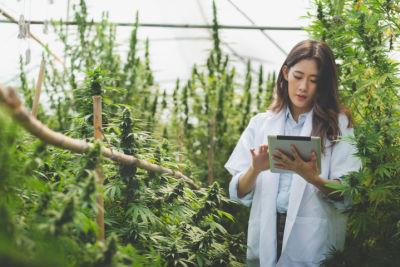
Friday March 9, 2018
 Education
Education
Fearful of past rhetoric and stigmatization, there is plenty of confusion over the medicinal properties of cannabis and its derivatives. Thankfully, a new report has started to clear things up. A recent study conducted by the World Health Organization (WHO) has found that the cannabinoid cannabidiol, or CBD, has nearly zero health risks.
For patients who use CBD, the WHO reports that the most adverse problems stem from drug-to-drug interaction. By itself, CBD has shown almost no health risks to humans. It is “generally well tolerated” by patients and has a “good safety profile” according the report.
This is good news for cannabis activists across the world. More countries are opening their doors to accommodate CBD as a medicine, and the report shows no evidence of recreational use or public health problems associated with pure CBD. On top of that, this study marks an important precedent in cannabis research and will hopefully fuel the flame for even more research and positive results to come.
Now, let’s take a closer look at the results of the WHO study and its potential impacts on human health.
Where Does CBD Come From and How is it Consumed?
Cannabis plants come in a variety of cultivars, or types, and each contain a certain percentage of CBD. The hemp cultivars have higher concentrations of CBD than those harvested for their THC content.
CBD is produced from the decarboxylation of cannabidiolic acid, an acid found in cannabis cultivars. Decarboxylation will occur under a few conditions: intense light exposure, heating or aging. When cannabidiolic acid loses a CO2 molecule, the result is pure CBD which can be safely consumed by humans.

Similar to flower, CBD can be incorporated into several different products, making it easy for consumers to choose options that fit their favorite methods of consumption. CBD isolate can be dabbed, vaporized, or incorporated into foods for edible ingestion. Many people consume CBD in the form of an oil as well.
The Toxicity of CBD
WHO’s report states that CBD has “relatively low toxicity.” Their research suggests that CBD has almost zero impact on animal behavior, unless administered in high doses. Likewise, high doses are also thought to suppress the immune system.
For humans, WHO reports there is no abuse potential with CBD, zero negative psychoactive or physiological responses to its use and does not alter the impact of THC from human consumption.
At the cellular level, the report suggests there is zero effect on most non-tumoral cells. For pregnant humans, CBD is reported as having no impact on embryonic development.
In mice, the studies show that no physical dependence can be associated with the use of CBD. This report does not suggest the same for THC, but overall, CBD appears to have minimal negative impacts on humans.
How Does CBD Help Humans?
The report from the WHO surmises that the strongest research for the benefits of CBD is in its applications for epilepsy. Apart from the overwhelming evidence of the benefits offered to epileptic patients, the report mentions a diverse range of benefits that need further research.

For example, it’s been shown that CBD can ease drug addiction from opioids, cocaine, psychostimulants, tobacco, and, yes, even cannabis. The WHO is cautious in this sense, and strongly suggests that more research is needed into its anti-addiction properties.
Not only does it help with addiction, CBD has also been shown to provide relief for inflammation, asthma and psychosis. Most importantly, CBD has shown efficacy in stimulating apoptosis in tumor cells (effectively killing them) as well as acting as an analgesic for many different ailments and pain.
What can Future Research Show Us About CBD?
According to Table 1 in the WHO report, there is a plethora of diseases that can be treated with CBD. It can ease pain and spasms in multiple sclerosis patients, inhibit rheumatoid arthritis and reduce infarct size in cardiovascular disease.
Anxiety, depression and nausea all show positive responses to CBD ingestion, and patients with severely debilitating diseases like Parkinson’s, Huntington’s and Alzheimer’s Disease all show myriad positive reactions to CBD. As mentioned above, CBD also has shown to relieve a variety of ailments in pets as well.

Thanks to reports like this one, research is likely to expand in the future. In 2015, the DEA eased restrictions on FDA-approved CBD studies and Canada did the same in 2016. With major Western countries taking a stance on removing the stigma associated with the medical properties of cannabis cultivars, the future of research into its medicinal usage is sure to grow.
For the medical cannabis industry, this means more opportunities to provide relief to patients who are desperate to treat their ailments with natural cures. It indicates that more countries, and more states, are going to open their doors to medicinal cannabis and will begin to view CBD has a healthy alternative to addictive and harmful pharmaceuticals.
Takeaways
Since CBD is incredibly safe for human consumption and offers health and healing properties that have already been well documented, there is no reason not to pursue future research into its benefits. CBD has the potential to change a countless number of lives across the world.
As the medical cannabis industry expands and research explores all potential alleyways, the findings will be sure to rock the pharmaceutical industry. If one plant with such limited research can already show such potential for human health, focused research into its medicinal uses is bound to change the world.
Have you benefited from the use of CBD? Comment below!







